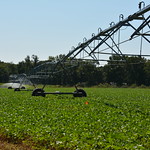I was
asked to guest lecture for a graduate level Extension Methods class and to
cover in 40 minutes eXtension, use of social media in Extension, engaging
traditional and non-traditional audience via technology. Other instructions
were: “Have some fun with the group. Include anything (relevant) that you
wish you knew at a young Extension agent/ what skills will tomorrow’s agent
need to be successful.”
I was
rushed and frankly did not prepare enough for an explanation of eXtension. This
post is my attempt to explain eXtension and share openly some of the
discussion. I am trying to become better at “working
outloud” as Harold Jarche drove home the point in the panel discussion at
National eXtension Conference.
I
start most of my presentations with questions to the people in the room. The
answer to the first question, “What is Cooperative Extension’s best resource?”
is always “its people”. I have never heard anything different. The reason I
asked this question is that it is people who build relationships. It is those
relationships should be made and maintained online—just as we expect Extension
professional to establish relationships in their physical meetings.
The
second question was: “What makes Cooperative Extension the best choice—the
optimal choice—possibly the only choice for its mission?” One lady answered it
is the people and diversity of expertise Extension has (apologies to the
engaging lady for my severe shortening her response. The other response was that
Extension provides research-based information.
By
all means Cooperative Extension needs to continue to provide research-based
information, but Cooperative Extension is not the only organization or
individuals who are doing that. Citizens provide research-based information as
well as other universities. We are all aware of that there are many people and
organizations that share information that is not grounded in research. We also
have to remember that research can sometimes provide mixed, conflicting, and
undecipherable information. There is growing evidence that the trust of
universities is waning. People do trust other people who are in their friend
and colleague circles.
There
are several references on the topic of trust in universities. These are just a
sampling:
Cooperative Extension’s Past
At
one time, everyone knew the Extension agents. Extension agents were seen as
responsive. They not only provided home & farm visits, but they included
farmers and others in research. The local Extension agent was known as the link
to the land grant universities. They were the connection to the most recent
research and they were the ones who introduced young people in the community to
higher education and land grant institutions. Extension agents were a part of
the elite group in the community with college degrees.
Cooperative
Extension’s Present
In 1993, Dave
King wrote a Journal of Extension article about Cooperative Extension’s image deficit. We also
know from the 2009 Copernicus study
that the younger the generation is less likely to know of Cooperative Extension
or will have ever used Cooperative Extension. Though the study concentrated on
the branding issues and not making the link from our flagship programs—4-H and
Master Gardeners—I also believe that we are not reaching enough people. The
study also showed that for those people who have used Cooperative Extension
they thought Cooperative Extension provided value.
Who
has heard of and used Cooperative Extension?
We can’t talk about changes in last few decades
without talking about the significance of Tim Berners-Lee proposal
in 1989 that created what we now know as the
Web. Berners-Lee released the code for free for an “information management” system. We not only owe Berners-Lee for
his foresight in technology but also his vision and continued voice in
understanding the depth and breadth of the advantage of that the “free code”
and campaigning for Net
Neutrality.
John Hartley, a student in the class, referred to
some opinions that mobile devices are killing
the idea of hyperlinks because data are sitting in silos and
not including hyperlinking—the foundational concept of the Web. The social
online abilities are obvious changes as well.
Skills
for Cooperative Extension Professionals.
We briefly talked about the six drivers of change
that the Institute of the Future describes in their report on the work skills needed for future knowledge
workers. The drivers
are: rise of smart machines and systems, globally connected world, superstructed
organizations, new media ecology, computational world, and extreme longevity.
In this report, IFTF describes 10 skills needed for the future.
We also talked about the Extension Committee on
Organization & Policy (ECOP) sponsored a study on the skills needed for the
21st
Century Extension professional. Skills from both of these
studies are shown in this table.
Future of Extension
In one slide I talked about the future of
Extension and these are some of the things that I discussed that Cooperative
Extension needs to be doing:
- Build new
relationships and maintain traditional relationships online.
We cannot scale ourselves by with our current
face-to-face relationships. Also there are many potential clientele who simply
do not have a desire to drive to the county office or attend a physical
meeting. Even some of our current clientele are asking for more flexibility in
learning opportunities.
- Learn informally
through information flow and others online.
Cooperative Extension professionals are the
epitome of knowledge workers. Extension, like many organizations, does not have
the capacity to provide all training and knowledge to its professionals.
Cooperative Extension professionals should have the desire and flexibility to
learn informally from others through online networks. Using the relationships
with others to filter and focus on pertinent information.
Cooperative Extension has tried to provide
services and employment by seeking demographic diversity. We also need to be
more cognitive of seeking out clientele and others who have different political
ideals, social beliefs, disciplines, and culture. Diversity of thought provides
opportunities for innovation and improvement our reach and impact of our
programs.
- Integrate
research and extension beyond what we currently do.
- Know that we are
not the only experts and that complex problems cannot be solved and forced
(i.e., through logic models).
The Cynefin
framework describes how solutions for complex problems derive different results
and cannot fit into neat model. Rather that complex problems should be address
in a probe, sense, and respond.
- Learn outloud and
curate.
- Extension has traditional
been very good curators, putting information into context and meaningful
descriptions. To increase our reach and impact, we should provide our
knowledge and curate online in open and transparent forums.
A few of my own thoughts on the attributes are a
successful future for ExtensionTransparency and openness in our work,
decisions, and findings.
All Cooperative Extension materials were public
domain before 1990. Creating and scaling our work cannot be done easily through
all rights reserved products (Creative Commons licenses that allow for easy
sharing and remixing).
- Inclusion of
people outside of Extension, particularly passionate amateurs in our work
this allows for scaling our work without growing our organizations.
- Ability to test
(and fail) more easily to acquire more agility and innovativeness.
eXtension
There is no federal or centralized system for
Cooperative Extension. Cooperative Extension obviously has federal ties with
USDA, ECOP and Association of Public Land-grant Universities. eXtension provides opportunity to find
synergies across state lines with a national online presence. eXtension is more
than a web site—it’s a presence, it’s professional development, and it’s a
mechanism to breakout of our geographic buckets.
eXtension is currently funded through New
Technologies of Ag Extension (NTAE) and assessments from the Cooperative
Extension institutions.
Content is built through collaborative efforts
among Cooperative Extension faculty. Communities of Practice (CoPs) provide the
mechanism to develop content (content is more than the text, content is also
videos, webinars, social media, etc.). There are opportunities for
CoPs sometimes include others outside of
Cooperative Extension. www.extension.org
is the hub for eXtension.
Ask
an Expert https://ask.extension.org/ is an opportunity for
anyone to ask questions on through widgets. These widgets can be installed on
any web site. AaE provides one-to-one engagement prospects that are analogous
to telephone calls that come into county offices. People ask questions through Ask an Expert
widgets and Cooperative Extension/University staff and volunteers answer them. AaE
widgets can be customized for area of interests—generally around the CoP topics
or locale. Many county offices use the widgets and direct the questions to
their own staff. Questions can be distributed throughout the Cooperative Extension
system, in other words the system has the “local offices’ back”. A public
option is available for the questions so the questions can be searched and
commented on increasing the opportunities for discoverability and engagement. Reports are available by state and individual.
This feature is helpful for end of year reporting for Extension professionals.
There were 48,000 questions last year answered
through AaE. 54% of the people asking questions had never heard of Cooperative
Extension. 44% of the people described that their questions had some or
significant economic value.
Texas answered the most questions. Many questions
come from metropolitan areas, like Houston (Harris County).
Learn https://learn.extension.org/
is a listing of synchronous online professional development and other
learning opportunities. Events listed maybe hosted by eXtension, others in
Cooperative Extension and other entities. Anyone can post events in Learn with
Google, Twitter, Facebook or eXtension IDs.
Each page for each learn event can serve as holding place for everything
related to the event. Those posting the events can include descriptions, time,
dates, connection information, slidesets, additional reading material and
recording links.
Those interested in the events can add them to
their calendar, follow the event for changes, and comment on the events by logging
in with Google, Twitter, Facebook or eXtension IDs. Those who “follow” events can see are listing
of all the events they participated and presented.
There were 494 webinars listed in Learn in 2013.
Campus http://campus.extension.org/ is
an asynchronous integrated online learning platform using Moodle. Campus
provides course delivery tools and services that can uniquely combine web
pages, videos, books, lessons, assignments, forums, chat, certificates,
databases, glossaries, quizzes, journals, and questionnaires into personalized
learning environments.
Courses can have closed or open enrollments. Courses
can be fee-based or free.
The CoPs issued almost 15,000 certificates in
2013 and had 21,000 active users. There are more than 573 courses in Campus.
Create http://create.extension.org/ is
the main place where the CoPs collaborate. Create is also used an internal work
space. When articles are written collaboratively in Create, reviewed by peers,
and copy edited they are then published to published to www.extension.org where the content is indexed in search
engines. Though anyone can see the content in Create, one must have an
eXtension ID and belong to the community to edit anything in Create.
People https://people.extension.org/ is
where one obtains an eXtension ID, creates a profile, list social networks and
interests, and indicates profile settings for Ask an Expert, Create, Learn, and
Data. People serves a springboard
for any work that requires an eXtension ID. People is great way to find communities and colleagues .
In closing, I proposed these questions for the
students to consider:
- What are the forces
important for Extension and land-grants to adjust to?
- What should
Extension focus on that will make us successful in the future?
- How do those
focus areas affect our work force?
References
National eXtension Conference Master Panelists
https://learn.extension.org/events/1548
Facing the Image Deficit by Dave King http://www.joe.org/joe/1993fall/tp1.php)
An analysis of the priority needs of Cooperative
Extension at the county level by Harder, Lamm and Strong http://www.jae-online.org/attachments/article/56/Harder_etal_50_3_11-21.pdf
Learning and Working
within a Learning Network
Other recommended readings:

![_-_ complexity [1]](https://farm1.staticflickr.com/182/384027019_5e64727276_q.jpg)



